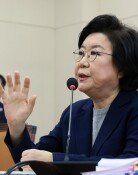The Trump Doctrine
The Trump Doctrine
Posted December. 20, 2017 08:20,
Updated December. 20, 2017 09:00
U.S. President Donald Trump has defined China and Russia as revisionist powers that “challenge American power, influence, and interests, attempting to erode American security and prosperity” in the National Security Strategy (NSS) on Monday (local time). The NSS called the two countries “rival powers” and announced that protecting the interest of the United States will be the priority of the NSS based on the “America First” policy. President Trump has unveiled his plan to reshape the international order by holding Russia and China in check to maintain the American hegemony. American press defined this as “Trump Doctrine,” saying that the “America First” policy has evolved from a political slogan to a driver of diplomatic policies.
Trump mentioned China 23 times in his speech and said, “The United States will no longer tolerate economic aggression or unfair trading practices,” suggesting that he will not allow China to emerge as a hegemon in Asia. He also forewarned that he would overpower China by investing in military power, saying that “extraordinary strength” is the best defense. This is an announcement that the United States will halt cooperation with China, which was once thought to choose the path of liberation, and also a declaration of war against China that heralds the era of new cold war between the United States and China. The Chinese embassy in Washington on Tuesday said confrontation between China and the United States would lead to mutual losses.
Trump’s demonstration of strong will to resolve the North Korean nuclear crisis carries a significant meaning for South Korea. He mentioned North Korea 17 times while defining North Korea’s cyber-attacks and nuclear and ballistic missile programs as a “global threat” and announcing resolution of the issue is not an option. He also said, “We will cooperate on missile defense with Japan and South Korea to move toward and area defense capability.” This collides with China’s “three Nos” stance against additional THAAD deployment, MD system and trilateral alliance between the United States, Korea and Japan, which was agreed with South Korea. It is also at odds with South Korean presidential office Cheong Wa Dae’s explanation that the “three Nos” policy of China has been discussed with the United States.
Trump’s de-facto inclusion of military options to “improve options to compel denuclearization of the peninsula” also collides with the agreement between Korean President Moon Jae-in and Chinese President Xi Jinping on “no war on the Korean Peninsula.” The NSS clarified, “Our alliance and friendship with South Korea, forged by the trials of history, is stronger than ever.” This is somewhat reassuring, but Korea needs to contemplate on the diplomatic issues in the future. Trump’s hard-line stance against North Korea and Xi’s stance to peacefully resolve the nuclear issue might force South Korea to choose a side. In any case, South Korea’s priority should be the national interest, which the country should watch against the hegemony race between Washington and Beijing by safeguarding its security based on the solid KORUS alliance.




![하버드 의사가 실천하는 ‘뇌 노화 늦추는 6가지 습관’ [노화설계]](https://dimg.donga.com/c/138/175/90/1/wps/NEWS/IMAGE/2026/01/22/133210626.3.jpg)


